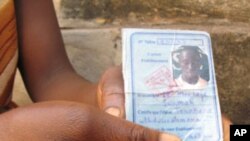The West African nation of Guinea is about to complete a transition from a coup to military rule to a democratically-elected government. There have been many twists and turns in Guinea's recent history.
Thousands have braved heavy rain to rally in the run-up to the second round presidential election between former Prime Minister Cellou Dalein Diallo and long-time opposition leader Alpha Conde.
One year ago, military ruler Captain Moussa Dadis Camara, made repeated appearances on state television to publicly humiliate government officials, foreign diplomats and investors, in what became known as the "Dadis show."
African commentators expressed worry about the future of Guinea, saying the leader's erratic conduct was reminiscent of despots from the past. Captain Camara had taken over in a coup after the death of long-time ruler Lansana Conte in late 2008. Mr. Conte's more than two-decade rule had been marked by frequent protests and purges in the military.
But then Captain Camara was shot by another member of Guinea's military, Lieutenant Toumba Diakite, while both were being investigated by the United Nations and human rights groups over their role in suppressing a September 2009 protest. Diakite went in hiding, while Captain Camara went to get treatment in Morocco and then Burkina Faso.
After lots of diplomacy from foreign governments, another military man General Sekouba Konate took over, and kept his promise to hold elections this year.
Yale political anthropology professor and West Africa expert, Michael McGovern, is not completely surprised by the turn of events. "Guinea does have a dual legacy in which a lot of people aspired to this kind of democratic transition for a long time and for as long as they were prevented from going in that direction by an army that was willing to actually kill people in order to stay in power they did not have much choice. But as soon as that barrier was lifted by General Konate then things moved forward very quickly," he said.
McGovern credits the bravery of non-political actors. "Civil society and students and women and youth groups had all really put a lot of work into a democratic transition before it was even possible for it to happen," he said.
There were protests after the first round of voting June 27, when supporters of candidates who failed to make the final cut alleged there had been rigging.
After court delays to consider their allegations, Guinea's Supreme Court confirmed the official results, and gave the go-ahead for the second round of the election to take place.
No date has yet been set.
Guinea Nears Democratic Transition




